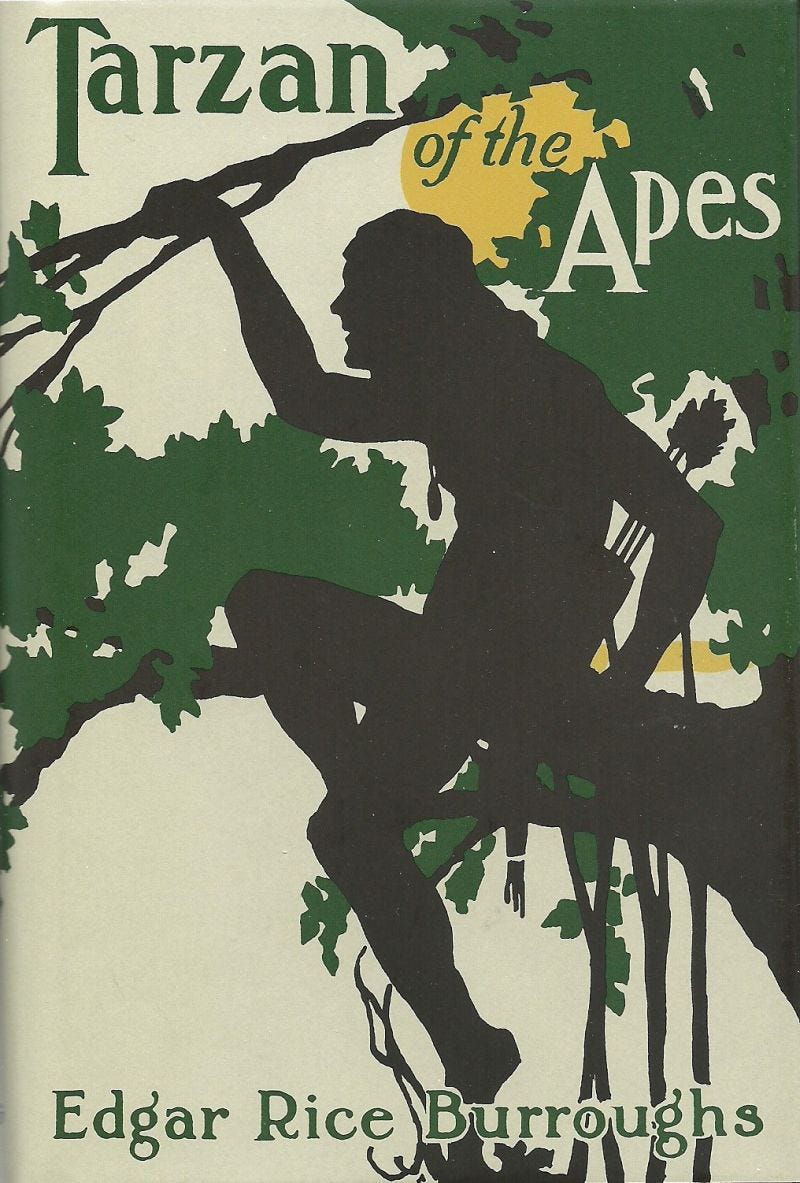Tarzan on Guard Around Black Men
Check out this old paper about how the book Tarzan of the Apes, if indeed the viciously racist text everyone always makes it out to be, undermines its own racism
Tarzan on Guard Around Black Men
See the full paper here.
Abstract.—I have two main goals in this paper. First, I want to ward off the quite feasible interpretation that Tarzan, in his long speech towards the end of Edgar Rice Burroughs’ Tarzan of the Apes, is endorsing the view that black males are particularly ferocious. Second, I want to argue that Tarzan’s between-the-lines claim that he will continue to be on guard around black men is reasonable for his situation and not a function of racism. My additional hope is to show that if Tarzan of the Apes is a racist text, as it is widely believed to be, it undermines its own racism particularly through Tarzan’s speech, where he arguably endorses the view each person must be judged individually, case by case.
1. Introductory Remarks
For most commentators, there is little question that Tarzan of the Apes (TA) is racist in the most virulent of ways.[i] Here are some stark examples motivating the reading of TA as a racist text—a text that regards race as a heritable feature accounting substantially (indeed, in a buck-stopping way) for character, and that regards a member of another race as inferior on the basis of this fact. TA arguably implies that Tarzan, “the killer of beasts and many black men” (Burroughs 116), would not have achieved mastery over the African jungle were he not—to use the literal translation of his name—White Skin (Carey-Webb; Kasson 212; Newsinger 62). The bumbling and corpulent Esmeralda, who serves as Jane’s loyal domestic servant, is a mammy character arguably meant to reinforce anti-black stereotypes, as well as the (revisionist) notion that house slaves stayed on as servants because they were such a loving part of the family (see McElya 3; Newsinger 62). The indigenous tribesmen, in addition to being depicted as superstitious and ignorant demons (as is typical of anti-black literature: hooks 127; Fanon 20, 112, 146), are seemingly considered lower not only than whites, but perhaps apes as well, in that they violate the cannibalism taboo recognized, in some sense at least, by Tarzan and even the apes of his clan (see Berglund 1999). Despite being born and raised in the jungle, and despite being sexually vigorous, Tarzan does not seem to be attracted to the apes he grows up with or the blacks he frequently encounters; and this may suggest a message that, as far as TA is concerned, miscegenation, on a par with bestiality, is unnatural and wrong, and that a healthy member of the superior white race would have no part in it (see Theroux). Looking beyond the confines of TA itself, a book bowdlerized right away due to offensive racial language and depictions (see Schneider), the racist reading seems to be corroborated by a rather damning quote from Edgar Rice Burroughs (ERB) himself. Describing his motivation behind writing TA, the first out of more than two-dozen books in the Tarzan series, he explains: “I was mainly interested in playing with the idea of a contest between heredity and environment. . . . For this purpose I selected an infant child of a race strongly marked by hereditary characteristics of the finer and nobler sort” (see Taliaferro 14).
Given the above listing of evidence, it goes without saying that picking out a racist discourse in TA is quite easy. Upon close and open-minded examination, however, this picture in the least gets significantly muddied—indeed, deconstructed in the technical sense of that term; that is, in the way that having Bart Simpson on your tie deconstructs your tie: a formal garb undermining its own formalness. Not only are there feasible grounds for explaining away even the aforementioned suggestions of racism,[ii] there also thrives a considerable anti-racist discourse—one that, at minimum, renders TA aporetic concerning its stance on racism, and that may even prove strong enough to preclude our counting TA as racist in the way defined above (thus dissolving the aporia in question). I will present a few elements of such evidence in this paper, but I will do so mainly in service of my examination of a narrower topic: whether Tarzan is committed to the view that black men are particularly ferocious. To this end, I will focus on a late passage, one of Tarzan’s longer speeches, where he voices staunch opposition to the view that black men are particularly ferocious, endorsing instead the view that each being deserves to be judged individually, not as a token of a type.
I have three goals in this paper. First, I want to ward off the quite feasible reading that Tarzan is speaking facetiously in this passage, that he is trying to convey the opposite of what he literally says. In short, I want to argue against the interpretation that Tarzan truly believes that black men are particularly ferocious. Second, I want to argue that Tarzan’s between-the-lines claim, here in this speech, that he will continue to be on guard around black men is reasonable for his situation and not a function of racism. Third, I want to show that, if Tarzan of the Apes is a racist text, it undermines its own racism particularly through Tarzan’s speech.
Notes
[i] Here are some recent examples: Bady; Bederman; Berglund 1999 and 2006; Carey-Webb; Cheyfitz; Jacobson; Jurca 1996 and 2001; Kasson 212, 717; Newsinger; Rivera 104; Slotkin; Sommer; Taliaferro; Theroux.
[ii] Here is a smattering of commentators who voice such a defense: Bozareth; Faulkner; Lupoff; Porges; Robinson; White 796.
Kritikos: Journal of Postmodern Cultural Sound, Text, and Image 1.14 (2017)





